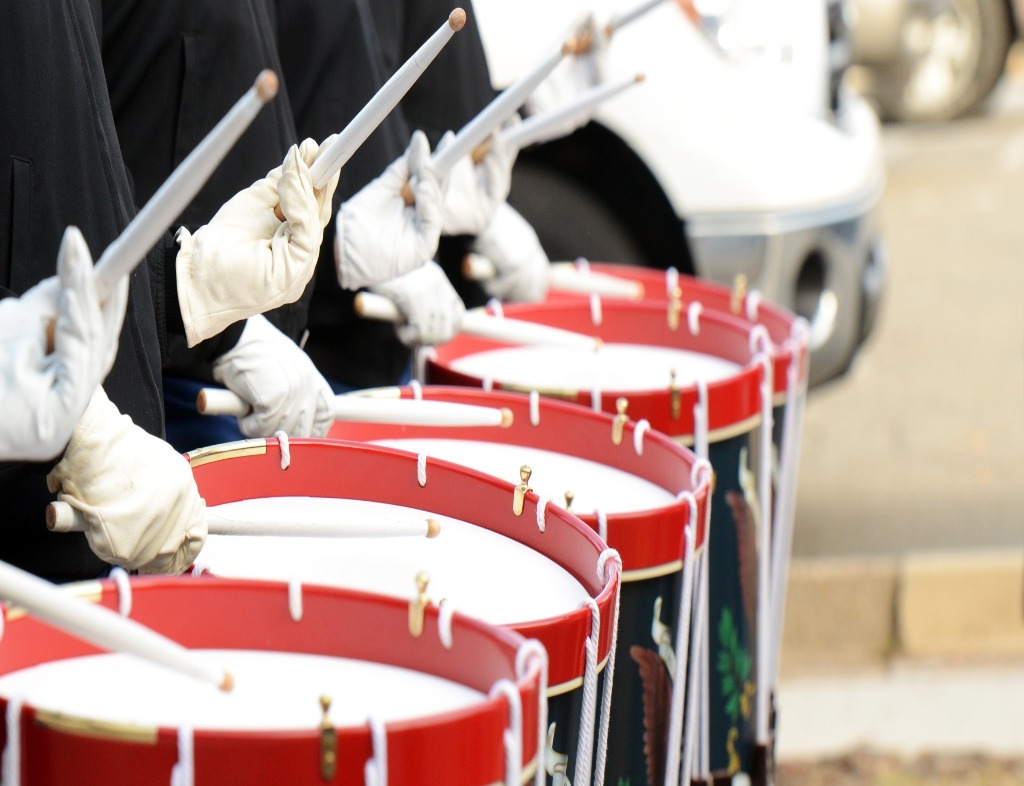Here in Washington, DC, we have access to so many cultural institutions when we want a night on the town. Everything at the Kennedy Center, lots of other theaters, jazz venues, orchestras, recitals, choruses, all the museums…We also have the incredible multitude of Military ensembles at our fingertips.
By my count, there are 36 ensembles that perform year-round here. They are concert bands. Ceremonial bands. String ensembles. Chamber groups. Choirs. Jazz ensembles. Rock bands. All representing the Air Force, Army, Marines, and Navy. (The only missing branch of the Military is the Coast Guard, whose premiere band is stationed in New London, Connecticut.)
And I suppose we are also lacking the Space Force Band, which I hear is supposed to be out of this world.
[Pause for Laughter]
Since we’re gearing up for a week of patriotic celebration, I thought it would be a good time to give a big shout-out to Military musicians, who make our country proud through their musical excellence.
As you can imagine, these ensembles perform in venues all over the DC Metropolitan Area. Since I live near the Capitol Building, I love walking over there to catch summer concerts that some bands present on the Capitol’s West Front Steps. As the music’s playing, you can look out over the National Mall and see the sun go down behind the Washington Monument and Lincoln Memorial. I’ve been here for six years, and this has yet to get old.
As someone who works in the Performing Arts, I am also amazed and appreciative for the work that these ensembles do on tour. For weeks or even over a month at a time, they travel to every corner of the US, often stopping in many places that might not have access to quality performances–at least, not on a regular basis. A frequently discussed topic in our industry is how to bring the art-form to underserved areas. The Military makes it happen all the time, and from what my friends in these groups report back, audience members are often very moved.
I’m also in complete admiration of the dedication of these ensembles to creating new compositions and new arrangements. In fact, there are arrangers on staff, whose work is programmed on a regular basis. Here’s an example. “Song to the Moon” from Antonin Dvorak’s opera Rusalka, which was arranged by the US Navy Band’s Chief Arranger, Scott Silbert.
Military ensembles are quite invested in Music Education. All throughout the year, they present concerts and masterclasses in schools all over the country. They also host solo competitions and instrument festivals. As a trombonist, I’m especially grateful to the US Army Band for hosting the annual American Trombone Workshop. They organize performances of the best trombonists in the world, competitions for students and young professionals, and masterclasses presented by highly esteemed pedagogues.
All this incredible work presenting concerts, cultivating new audiences, creating new works, providing educational opportunities…these are all things that I love seeing my tax dollars go towards. But I’d be remiss if I didn’t also mention ceremonial performances. Military musicians perform for White House functions. Arrivals and departures of foreign dignitaries. State funerals. National holidays and commemorations.
They also perform during the burials of our Veterans and those who have fallen while in service. Often in extreme weather, these musicians perform for the loved ones of those who devoted their lives to the United States. The gravitas of these moments is among the most poignant that any musician will encounter while on the job. I have complete admiration of their work, and I’m amazed that they execute these duties in all kinds of tough working conditions.
An immediate example that comes to mind is “Taps” at John F. Kennedy’s burial. Keith Clark of the US Army Band performed this in the bitter cold. With no warm-up. After (I’m assuming) standing at attention for a long period of time. With the eyes and ears of the entire country upon him.
Our Military ensembles aren’t a mere luxury for the United States. They are vital to the dignity of our Armed Forces as well as the achievement and accessibility of music to all Americans.
Want to catch a concert?
The US Air Force Band
The US Army Band
The US Army Field Band
The US Coast Guard Band
The US Marine Band
The US Naval Academy Band
The US Navy Band

Subscribe via Email
Enter your email address to subscribe and receive notifications of new posts on the first Monday of each month by email.


Thanks for the shoutout! I’m proud to be a member of one of the DC military bands, even if I’m always on the road and my concerts aren’t ever around the Beltway area. As tough as it is on the road, I love bringing our music to the communities, large and small, all across our country. To honor the service of veterans and work with children brings me great joy. While life is.very different for me than for someone in a major symphony gig, I have to say I love my job!